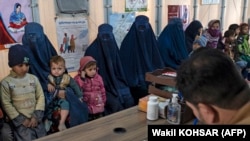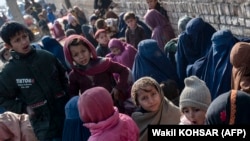Every morning, Zakira prepares Afghan dumplings known as mantu and waits for her sons Arsalan, 12, and Alyan, 10, to return from school when they take the mantu to the nearby streets to sell.
"As refugees in Pakistan, this is how we earn a living," said 38-year-old Zakira, who goes by her first name, adding that her husband, a laborer, "can't often find a job."
Zakira, a teacher, told VOA she can't find a job in Pakistan because of her refugee status, and that is why her children work.
"It is difficult to see them selling food on the street instead of playing like other kids," she said. "But how will we pay the bills if they don't work?"
Zakira and her husband hold Afghan citizen cards issued in 2017 by Pakistan to Afghan refugees. More than 800,000 of the 3.1 million Afghan refugees have the cards.
"There are no benefits in having these cards, as no one would give me a job with it," Zakira said.
Another 1.35 million are registered as Afghan refugees, while more than 800,000 Afghans in Pakistan are undocumented.
Around 600,000 new arrivals were in the country before the Pakistani government started deporting undocumented Afghan refugees.
Deportations started last year
Pakistan began deporting undocumented Afghan refugees last September. According to the United Nations, about 575,000 refugees were returned, of whom 89% were undocumented.
Many of the documented refugees are also afraid, as local media reported in March that the government of Pakistan was preparing for the repatriation of Afghan citizen cardholders.
Loqman Jalal, 27, who was born in Pakistan and holds a citizen card, told VOA that Afghan refugees, whether documented or undocumented, fear deportation.
"There is fear that in the second phase, Pakistan will deport refugees holding ACC and then PoR [proof of registration] holders," said Jalal, a father of three who is concerned about their future.
In April, Pakistan extended the proof of registration cards for Afghan refugees to June 30.
The U.N., however, said an extension of three months would not lessen the uncertainty the Afghan refugees are facing in Pakistan.
Jalal said that the uncertainty makes it difficult for Afghan refugees in Pakistan "to live a normal life."
"Everything changed for us after the regime change [Taliban's takeover] in Afghanistan. We face many problems including the possibility of being deported," he said.
In May, the U.N. said it assisted the return of 18,700 refugees from Pakistan in the first quarter of 2024, a 14-fold increase from the same period in 2023.
"Fear of arrest/deportation, abuse by police or state authorities related to the proof of registration cards extension in Pakistan, no added protection value of the PoR card, and night raids" were some of the reasons, according to the United Nations High Commissioner for Refugees.
Sophie Jambazishvili, a senior protection officer for UNHCR in Kabul, told VOA that individuals with PoR cards, UNHRC asylum-seeker certificate holders and ACC holders were included among the refugees forcibly deported to Afghanistan.
"We have seen quite a variety of individuals with different legal backgrounds," Jambazishvili said about those deported by Pakistani authorities.
She said that Pakistan has not started the second phase of deportations, which will include the ACC holders.
"I have to say that we thought that would start. Thankfully, it has not yet fully been implemented," she said.
'Nothing left in Afghanistan'
Many refugees, including Zakira, fear that Pakistan will start deporting registered refugees.
She said that after living for decades in Pakistan, they have "nothing left in Afghanistan."
"I am sad for my children. If deported, I don't know what would happen to them."
Zheela Noori contributed to this report, which originated in VOA's Afghan Service.

